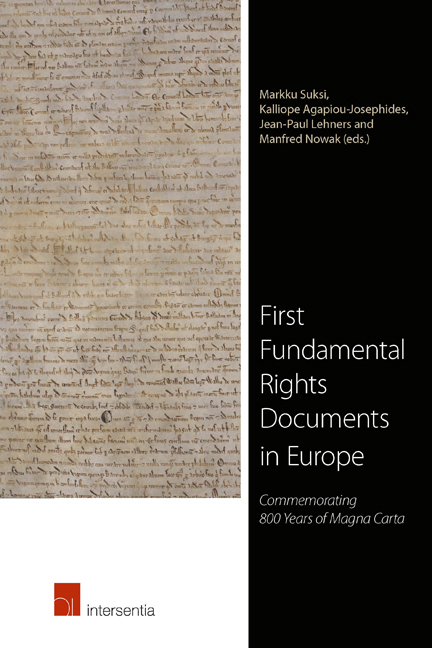Book contents
- Frontmatter
- Preface
- Contents
- List of Authors
- 1 Introduction
- PART I
- PART II
- 11 France: Foundational Importance of the Declaration of 1789
- 12 Sweden: Free Press as a First Fundamental Right
- 13 The Netherlands: The Batavian Staatsregeling as the First Fundamental Rights Document
- 14 Portugal: ‘Tropical Versailles’ in the Beginning of the Nineteenth Century
- 15 Luxembourg: Fundamental Rights in a Small State
- 16 Greece: Reflections from the Hellenic Legal Tradition
- 17 Denmark: In Love with Tradition
- 18 Germany: Fundamental Rights as an Instrument Towards the Rechtstaat
- 19 The Czech Republic: On the Road to Rights and Freedoms
- 20 Romania: The Birth of Fundamental Rights as a Form of Political Contention
- 21 Bulgaria: The Liberal Tarnovo Constitution
- 22 Finland: Rights to Facilitate Participation
- 23 Estonia: First Landmarks of Fundamental Rights
- 24 Slovakia: The Right of a Nation
- 25 Latvia: Second Part of the Constitution as a Project for Next Generations
- 26 The History of Fundamental Rights in Europe: A Long and Winding Road
- Index
20 - Romania: The Birth of Fundamental Rights as a Form of Political Contention
from PART II
Published online by Cambridge University Press: 15 December 2017
- Frontmatter
- Preface
- Contents
- List of Authors
- 1 Introduction
- PART I
- PART II
- 11 France: Foundational Importance of the Declaration of 1789
- 12 Sweden: Free Press as a First Fundamental Right
- 13 The Netherlands: The Batavian Staatsregeling as the First Fundamental Rights Document
- 14 Portugal: ‘Tropical Versailles’ in the Beginning of the Nineteenth Century
- 15 Luxembourg: Fundamental Rights in a Small State
- 16 Greece: Reflections from the Hellenic Legal Tradition
- 17 Denmark: In Love with Tradition
- 18 Germany: Fundamental Rights as an Instrument Towards the Rechtstaat
- 19 The Czech Republic: On the Road to Rights and Freedoms
- 20 Romania: The Birth of Fundamental Rights as a Form of Political Contention
- 21 Bulgaria: The Liberal Tarnovo Constitution
- 22 Finland: Rights to Facilitate Participation
- 23 Estonia: First Landmarks of Fundamental Rights
- 24 Slovakia: The Right of a Nation
- 25 Latvia: Second Part of the Constitution as a Project for Next Generations
- 26 The History of Fundamental Rights in Europe: A Long and Winding Road
- Index
Summary
INTRODUCTION
The story of fundamental rights in Romania goes back in time to the early seventeenth century. The territory of today's Romania was divided into three separate Principalities — Wallachia, Moldavia and Transylvania — which, at that time, were tributary states under the suzerainty of the Ottoman Empire and were organised and governed in the political and social framework of a domestic feudal authoritarianism. Even though independently constituted, the three Romanian States were invariably connected to one another through cultural and economic relations and cooperation, which encouraged the emergence of a common ideal of unity and cohesive action against external threats.
The first fundamental rights document was the modern charter of liberty established in Wallachia in 1631, named the Freedom Charter from Bucharest (‘Charta de libertăți’ de la București). Considering the nature of this agreement and the specific political circumstances of its time, this Charter may represent, according to Romanian scholars and historians, the possible foundation document of fundamental rights in Romania. The proclamation of this document was an expression of the will of Romanian society to create particular civil rights and freedoms for individuals, describing basic rights to be free from unequal treatment. The Freedom Charter from Bucharest makes reference to the right not to be killed without trial in front of judicial bodies and respect for all procedural safeguards. With an identical meaning to Article 39 of Magna Carta Libertatum (1215), these rights stipulated in the Freedom Charter from Bucharest are considered innovative for seventeenth-century Romania in the sense of an early writ of habeas corpus. Even though this principle talis qualis is not included in the text of the Charter, it emanates from the nature of the provisions themselves. The early conceptualization of fundamental rights and freedoms can be traced to several documents issued in the three Principalities. Nonetheless, the formal institution of fundamental rights was first introduced in Romanian territory in the first modern Constitution of 1866. Inspired by the liberal ideas of the Belgian Constitution of 1831, considered at that time the most liberal constitution in Europe, the Romanian Constitution of 1866 incorporated the values, principles and practices of Western liberal democracies, such as the democratic principle of separation of powers, the principle of representative government, the principle of national sovereignty and the recognition of fundamental rights and liberties.
- Type
- Chapter
- Information
- First Fundamental Rights Documents in EuropeCommemorating 800 Years of Magna Carta, pp. 251 - 266Publisher: IntersentiaPrint publication year: 2015



